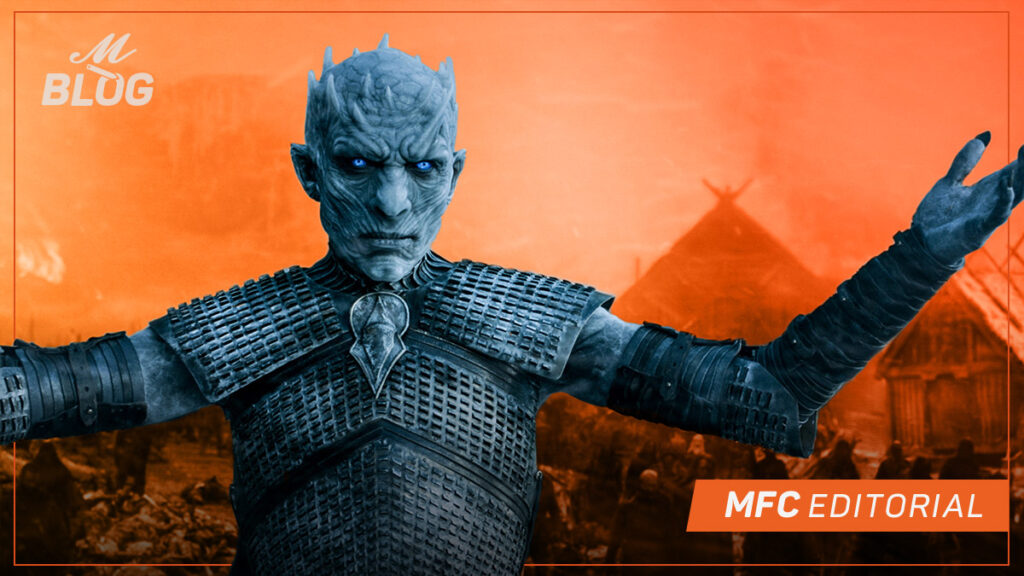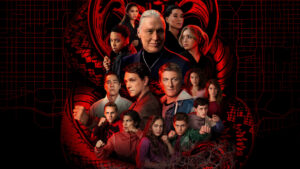
The Death of Game of Thrones
MFC Editorial
Game of Thrones, one of the most popular series in history, ended last May under the criticism of millions of disappointed fans.
After 8 years of loyalty, even the oldest followers of this story, have raised their voices claiming that the end of the series felt rushed, incomplete, or even that Game of Thrones lost its way long before the premiere of the eighth and last season.
In this MFC Editorial we will evaluate the themes of Game of Thrones and offer a possible answer to why they failed to close one of the most interesting stories of the last decade.
Enjoy our review of the final episode of Game of Thrones here
A study on death

One of the strengths of Game of Thrones, apart from its interesting universe and charismatic characters, is the thematic richness that it introduces into the epic fantasy genre.
Beyond being a political thriller that explores notions of power, what sets Game of Thrones apart from any other series is the unique way it has to use death as a theme and narrative motif. Thanks to this, the series shines in its surprising twists that, in most cases, occur through the death of key characters for the most anticipated development of the story, leaving us with the beautiful feeling of uncertainty that makes us go back for the next episode.
Game of Thrones seems to be a show especially about death and each of its characters is developed according to their relationship with it. How they give death and why, what they think about death, what value they give to it, how they win and how they lose to it. This is so from the first episode, where the first thing that happens is the revelation of the antagonist, Death itself, through the appearance of the wights. Next, we are introduced to the first hero of the story, Eddard Stark, whose sense of honor and responsibility is understood thanks to how and why he ends a life, executing a defector of the Night’s Watch who, fleeing from his destiny, ended up meeting it.
The season closes with the beheading of Stark thanks to the same honor that characterized him, giving a great closure to his narrative arc and consolidating the themes of the show. Meanwhile, in the north, Jon Snow was assured that the war of men matters little in the face of the threat of an endless night. From this point on, each season closes with the promise that the White Walkers move to take over the world of the living, the greatest danger that the characters must face: Death itself.
Enjoy our TOP 5 of the best episodes of Game of Thrones here
What went wrong?

Having established death as the central theme of the story for the past seven years, there is a discomfort with the development of the events of the last season, being a feature that was noticed from the fifth season, where the show began to surpass the books and showrunners David Benioff and D. B. Weiss were left with no story to adapt. Examples of this divergence are the deaths of characters such as Barristan Selmy and Stannis Baratheon, as well as the extermination of House Martell; arcs and characters of great value in the overall story until they became narrative obstacles for the show.
The eighth season of Game of Thrones took it even further, relegating Death to the same fate suffered by the mentioned characters and destroying the pillars on which the story had been built, leaving aside the story of the Night King and putting the fight for the throne at the center of the story, both arcs with unsatisfactory endings for the development they had.
Considering this, the absence of adaptable material is not enough excuse for the decline in the narrative quality that suffered the final season of Game of Thrones, because it’s not necessary to have read the books to feel dissatisfied with a story that had no pay-off, a concrete closure for the themes that it explored through his characters.
Although the final season of Game of Thrones closes several narrative arcs in a successful way, it is also true that it blatantly dispatches not only characters but also the most basic notions that make Game of Thrones what it was: a story with a plan of the original creator: George R. R. Martin.
The reason that most critics point out is the hurry with which the series ends, reaching conclusions that, although they could be quite accurate, failed to deploy a successful development of their causes and motivations, advocating more seasons or chapters as a solution for a better ending. Martin had claimed to be willing to develop up to thirteen seasons of the show and HBO seemed to be on board, however, David Benioff and D. B. Weiss assured that extending the series would not be possible in terms of budget, so they decided to end it in the eighth.
Conclusions

Although some claim that the hurried closure of Game of Thrones is due to the interest of David Benioff and D. B. Weiss to start new projects, such as their new trilogy of Star Wars movies, the reasons behind their decision are irrelevant.
The fact is that, in the attempt to direct the show towards the best possible ending, Game of Thrones ended up being a subversion of the main themes of the original story, as it’s not strange that it happens in the cinematographic adaptations of literary works.
Despite this, for all the fans who want more stories in Westeros, HBO is working with George R. R. Martin in the development of several new shows in the universe of Game of Thrones. Pretty good entertainment while we wait for Winds of Winter, the sixth novel in A Song of Ice and Fire, the literary saga on which Game of Thrones is based.







0 Comments